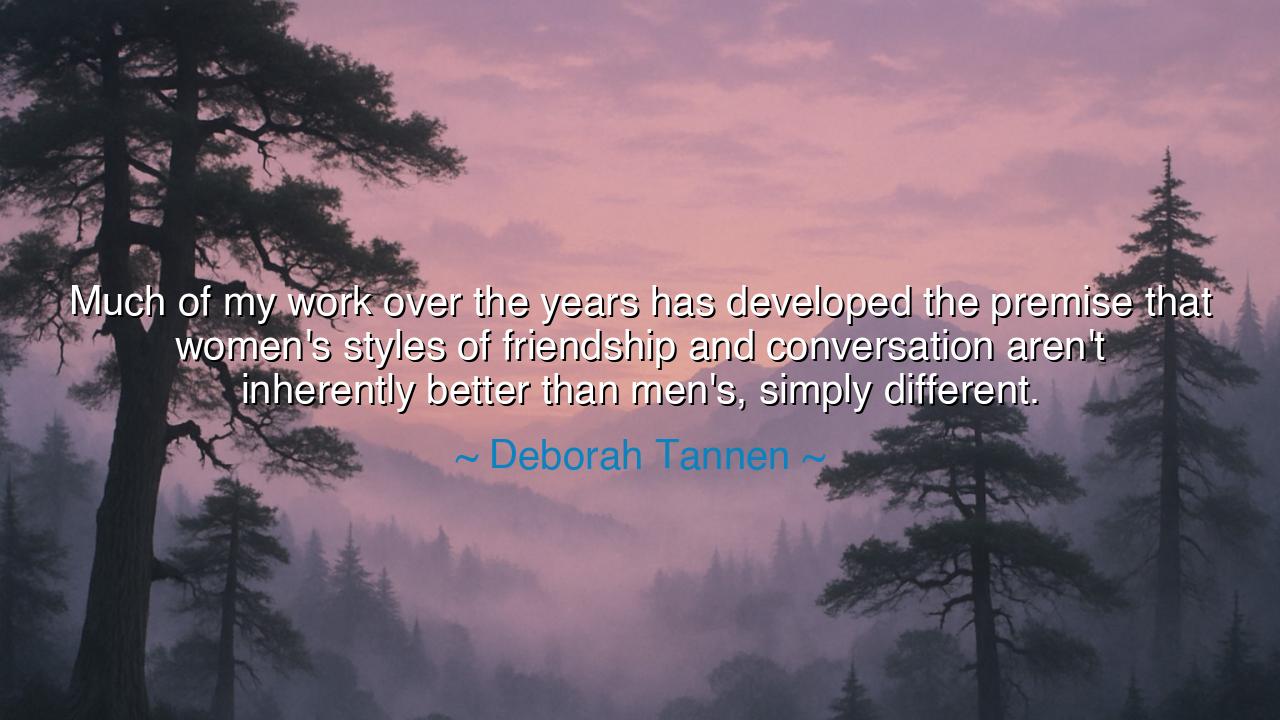
Much of my work over the years has developed the premise that
Much of my work over the years has developed the premise that women's styles of friendship and conversation aren't inherently better than men's, simply different.






In the intricate dance of human relationships, the ways in which we connect and communicate are as diverse as the people themselves. Deborah Tannen, a scholar of language and communication, speaks of this diversity when she reflects: "Much of my work over the years has developed the premise that women's styles of friendship and conversation aren't inherently better than men's, simply different." These words carry within them a profound truth: that friendship and conversation, two of the most sacred bonds between people, take on many forms. Each of us, regardless of gender, brings to these connections a unique set of practices and expressions, not based on a hierarchy of value but rooted in the diversity of experience.
In the ancient world, the roles of men and women were often defined by rigid expectations, yet even then, there existed a recognition that communication was not a singular, universal act. The Greek philosophers—particularly Plato and Aristotle—debated the nature of communication, with some, like Socrates, emphasizing the importance of dialogue in shaping the soul. Plato's Symposium explores the dynamics of friendship and conversation, showing that dialogue—whether between men or women—was the very act of drawing out one’s deepest truths. The conversations that Socrates had with his followers, regardless of their gender, were deeply personal exchanges that transcended the specific styles or roles that might have been expected by society. Through dialogue, the soul could be shaped and enlightened, a process that is no less true today than it was in the days of the ancients.
Tannen’s work touches upon a timeless theme—the differences in communication styles between men and women. She suggests that these differences are not better or worse, but simply different. This concept recalls the ancient wisdom that the world is built upon the union of opposites, the balance of masculine and feminine energies. The yin and yang, as taught by the Chinese sages, represent the complementary forces of life—neither being superior to the other, but both essential to the wholeness of the universe. In conversation, just as in life, men and women bring complementary perspectives. Each adds its own richness to the experience, whether through the directness often associated with masculine communication or the relational depth characteristic of feminine dialogue. Both are needed, just as day and night, sun and moon, each have their own time and purpose.
Consider the relationships of ancient Roman statesmen, such as Cicero and his intellectual dialogues. Cicero, a master of rhetoric, often engaged in debate and dialogue with his contemporaries, where the focus was on the art of persuasion, logic, and public speech—qualities often associated with masculine forms of communication. Yet, the women of his time—like Portia, his wife—held their own in conversations that were often more nuanced and empathic, reflecting a different style of communication that was no less powerful. Portia is depicted in the writings of Cicero not just as a wife, but as a partner who was deeply engaged in the intellectual and emotional life of her household. In their dialogue, they embodied a union of styles—Cicero’s direct, logical discourse, and Portia’s more reflective, emotional exchange—showing that different styles of communication could coexist and enrich the fabric of their relationship.
The essence of Tannen’s words can be seen in the friendships of these ancient figures: that the communication between friends is not measured by a single standard, but by the mutual respect and understanding that flow between them. Friendship, as exemplified by David and Jonathan in the Bible, was built on a foundation of trust and shared experience, where their communication, although marked by their differing roles and expectations, was no less powerful. They expressed their love and affection for one another not in the form of speech alone, but in the actions and emotions that arose from their connection. Here, we see that friendship transcends the style or manner in which communication is carried out—it is the intent and the depth that matter most.
The lesson for us is clear: we must embrace the diversity in the ways we connect with others. Whether in our friendships, families, or communities, the differing styles of conversation and expression are not to be judged, but celebrated. Tannen challenges us to move beyond the idea that one style is inherently superior to another, encouraging us to recognize the unique strengths that each person—whether man or woman—brings to the table. In doing so, we create a more inclusive world, where each voice is valued, and each style of communication is seen as a vital thread in the tapestry of human connection.
So, let us heed the wisdom of Deborah Tannen and the ancients, recognizing that communication is a diverse and sacred gift. Let us not seek to impose one style over another, but to listen with open hearts, allowing the rich variety of conversations to deepen our relationships and expand our understanding. In embracing the different styles of communication that each person brings, we not only honor their uniqueness but also cultivate friendships that are rooted in mutual respect, understanding, and shared wisdom. This, after all, is the true beauty of the human experience—a constant exchange of ideas, feelings, and beliefs, where each voice is heard and valued.






AAdministratorAdministrator
Welcome, honored guests. Please leave a comment, we will respond soon